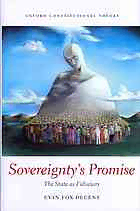
Sovereignty's promise : the state as fiduciary PDF
Preview Sovereignty's promise : the state as fiduciary
OXFORD CONSTITUTIONAL THEORY SeriesEditors MartinLoughlin,JohnPMcCormick,andNeilWalker Sovereignty’s Promise OXFORD CONSTITUTIONAL THEORY SeriesEditors: MartinLoughlin,JohnP.McCormick,andNeilWalker Oneconsequenceoftheincreaseininterestinconstitutionsandconstitutionallaw inrecentyearsisagrowing innovativeliteratureinconstitutionaltheory.Theaim of Oxford Constitutional Theory is to provide a showcase for the best of these theoreticalreflectionsandaforumforfurtherinnovationinthefield. The new series will seek to establish itself as the primary point of reference for scholarly work in the subject by commissioning different types of study. The majority of the works published in the series will be monographs that advance new understandings of the subject. Well-conceived edited collections that bring a variety of perspectives and disciplinary approaches to bear on specific themes in constitutionalthoughtwillalsobeincluded.Further,inrecognitionofthefactthat there is a great deal of pioneering literature originally written in languages other thanEnglishandwithregardtonon-anglophoneconstitutionaltraditions,theseries will also seek to publish English translations of leading monographs in constitu- tionaltheory. Sovereignty’s Promise The State as Fiduciary Evan Fox-Decent McGill University Bb 1 3 GreatClarendonStreet,OxfordOX26DP OxfordUniversityPressisadepartmentoftheUniversityofOxford. ItfurtherstheUniversity’sobjectiveofexcellenceinresearch,scholarship, andeducationbypublishingworldwidein Oxford NewYork Auckland CapeTown DaresSalaam HongKong Karachi KualaLumpur Madrid Melbourne MexicoCity Nairobi NewDelhi Shanghai Taipei Toronto Withofficesin Argentina Austria Brazil Chile CzechRepublic France Greece Guatemala Hungary Italy Japan Poland Portugal Singapore SouthKorea Switzerland Thailand Turkey Ukraine Vietnam OxfordisaregisteredtrademarkofOxfordUniversityPress intheUKandincertainothercountries PublishedintheUnitedStates byOxfordUniversityPressInc.,NewYork #E.Fox-Decent,2011 Themoralrightsoftheauthorhavebeenasserted DatabaserightOxfordUniversityPress(maker) CrowncopyrightmaterialisreproducedunderClassLicence NumberC01P0000148withthepermissionofOPSI andtheQueen’sPrinterforScotland Firstpublished2011 Allrightsreserved.Nopartofthispublicationmaybereproduced, storedinaretrievalsystem,ortransmitted,inanyformorbyanymeans, withoutthepriorpermissioninwritingofOxfordUniversityPress, orasexpresslypermittedbylaw,orundertermsagreedwiththeappropriate reprographicsrightsorganization.Enquiriesconcerningreproduction outsidethescopeoftheaboveshouldbesenttotheRightsDepartment, OxfordUniversityPress,attheaddressabove Youmustnotcirculatethisbookinanyotherbindingorcover andyoumustimposethesameconditiononanyacquirer BritishLibraryCataloguinginPublicationData Dataavailable LibraryofCongressCataloginginPublicationData LibraryofCongressControlNumber:2011939971 TypesetbySPIPublisherServices,Pondicherry,India PrintedinGreatBritain onacid-freepaperby CPIGroup(UK)Ltd,Croydon,CR04YY ISBN 978–0–19–969831–8 1 3 5 7 9 10 8 6 4 2 for my parents Wally and Joan Fox-Decent This page intentionally left blank Acknowledgements Thisbook began as a PhD dissertationwritten at the Universityof Torontowhile IwasinitsjointJD/PhD(philosophy)programme.Specialandheartfeltthanksgo tomysupervisor,DavidDyzenhaus.EvenwhileonsabbaticalinNewZealand,he remained in touch and encouraged me to persevere and dealwith the thickets of detailthatfrequentlyobscuredtheidea.Hereadcountlessdraftsofearlierversions of most of the chapters produced here, providing insightful and constructive suggestions within days (sometimes within the same day) of having received the latestbit.Astudentcouldnothaveamorededicatedandcapablesupervisor.What is more, although the thesis was defended in 2003, he has since offered equally generouscommentsonsectionsofthebookthathavebeenupdatedtotakeaccount ofmorerecentdevelopmentsinadministrativelaw. I am also very grateful for the assistance I received from the readers on my committee, Arthur Ripstein and Lorne Sossin. Their comments were invaluable, andalwaysforthcoming,especiallyinthefinaldaysleadinguptosubmission,when Imadenumerousunreasonablecallsontheir timetoreviewsuccessivedraftsand discuss ideas. They, too, have since given me generous comments on subsequent worktowardsthisbook. IoweasimilardebttoseveralcolleaguesatMcGillUniversity’sFacultyofLaw: Helge Dedek, Richard Janda, Robert Leckey, Rod Macdonald, Fre´deric Me´gre´t, Victor Mun˜iz-Fratecelli, LionelSmith, andSteveSmith.Iwould alsoliketothank many others for encouragement, discussion, and comments, including, Daniel Brudney,EvanCriddle,WallyFox-Decent,DennisKlimchuk,MatthiasMahlmann, Margaret Martin, Colleen Murphy, Sean Rehaag, Robert Shaver, Kaveh Shojania, MalcolmThorburn,MarkWalters,andRaquelYrigoyenFajardo. Various portions of the book were presented and discussed at a number of conferences: the Lon Fuller and Contemporary Legal Controversies two-part conference held at the law faculties of McGill University and the University of Toronto(2005);theYoungScholarsConferenceheldattheFacultyofLawofMcGill University (2008); the Dunsmuir Roundtable held at the Faculty of Law of the University of Toronto (2008); and a 2008 session of the McGill Political Theory Workshop.Mythanksgototheorganizersandparticipants. Special thanks are also due to a teacher, Johnston Smith, from St Paul’s High School in Winnipeg. While he did not did participate directly in this project, he sparkedmyinterestinpoliticalphilosophy,leadingmetoadoptascepticalviewof stateauthority. B viii Acknowledgements Ialsooweadebttoseveralstudentswhoprovidedresearchassistanceaboveand beyond the call of duty: Paul Clark, Matt Finn, Anthony Guindon, Carlos Iva´n Fuentes,andNelcyLo´pezCue´llar. Two former students, Stefan Szpadja and Robert Whillans, merit thanks for readingthroughthemanuscriptcover-to-coverduringthefinalrevisionsstageand providing innumerablehelpfulcommentsineverychapter.Robert,infact,didthis twiceover,underunreasonabletimeconstraints,andalsotookonthelaborioustask ofconvertingthenotestoamodern,uniformstyle. ThisbookwouldnothavebeenpossiblebutforthesupportoftheFacultyofLaw andtheDepartmentofPhilosophyofUniversityofTorontowhileIwascompleting a JD and later writing my doctoral thesis. In addition to my committee, Brian LangilleinLawandJoyceWrightinPhilosophywereespeciallysupportive.McGill’s Faculty of Law has since become my academic home. It has been an especially fertile and collegial setting for interdisciplinary research, in large part due to the leadership of its formerDean (nowJustice)Nicholas Kasirer and itspresentDean Daniel Jutras. Also, I would like to thank the Social Science and Humanities Research Council of Canada for financial support throughout my doctoral and post-doctoralstudies,aswellasduringthelatterstagesoftheproject. During the home stretch,GaryHill ofOUP provided exceptionalcopy-editing. Everychapterhasbeenimprovedbyhiswork. Some of the arguments in this book have appeared in articleswritten over the pastfewyears,andwhiletheyhavebeenextensivelyrewritten,Iamgratefultothe journals in which they were originally published for granting permission to use them in this book. Much of Chapter II appeared in ‘Fashioning Legal Authority from Power: The Crown-Native Fiduciary Relationship’ (2006) 4 New Zealand Journal of Public and International Law 91. Chapter IX is a revisedversion of ‘Is the RuleofLawReallyIndifferenttoHumanRights?’(2008)27(6)LawandPhilosophy533. Parts of Chapters I and IV were published in an earlier form in ‘The Fiduciary NatureofStateLegalAuthority’(2005)31Queen’sLawJournal259. Finally, I would like to thank Adriana Goreta, for extraordinary patience and support,andmyparents,WallyandJoanFox-Decent,whohavebeenthereforme throughoutthecourseoftheproject. Contents Epigraph xiii TableofCasesandLegislation xv Prologue—HobbesandLegalOrder 1 1. Thedemandsoflegality 1 2. Thepeopleastheauthorsofsovereignty 5 3. Theconstitutionoflegalorder 13 4. Trustasthebasisofthestate-subjectrelationship 19 ChapterI—Introduction: TheStateasFiduciaryandthe RuleofLaw 23 1.1 Introduction:Roncarelliandthefactofsovereignty 23 1.2 Abriefhistoryofthefiduciaryconcept 30 1.3 Towardsfiduciarydutiesinpublicsettings 34 1.4 Alegalconception 37 1.5 Arelationalconception 40 1.6 AKantian,interactionalconception 41 1.7 Achallengetolibertarianism 47 1.8 Beyondthestate 48 1.9 Summaryoftheargument 48 PART I—THE CROWN-NATIVE FIDUCIARY RELATIONSHIP ChapterII—SeekingSovereignty 55 2.1 Introduction 55 2.2 Guerin,Sparrow,andtheresistanceofAboriginaltreatyrightstodualism 57 2.3 ThebasisoftheCrown-Nativefiduciaryrelationship 62 2.4 ThelimitsoftheCrown’slegitimacy 69 ChapterIII—SomeObjections 75 3.1 Introduction 75 3.2 Paternalism,colonialism,andlegalpluralism 76
